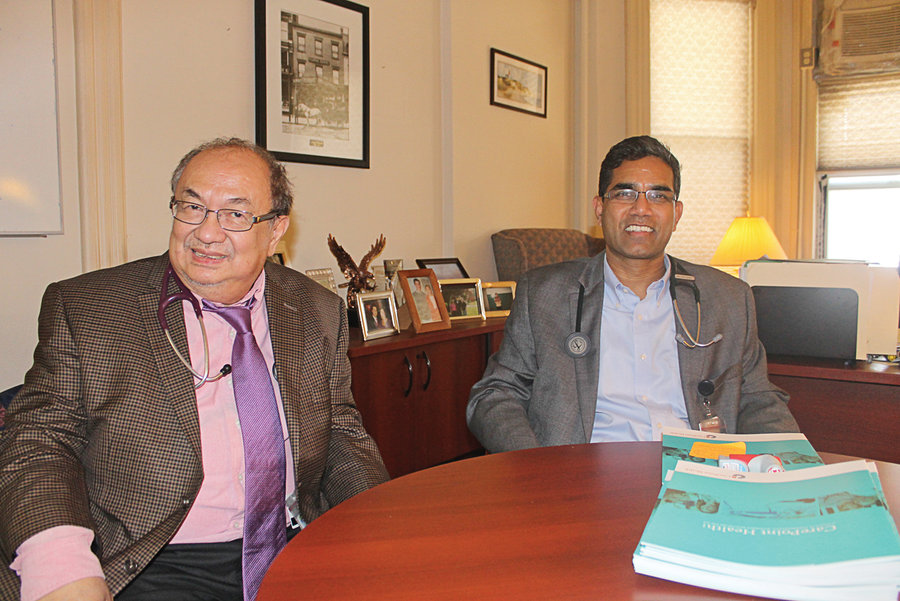Early in 2015, two doctors were talking in the catheter lab at Christ Hospital about the need for heart care in the Philippines.
Dr. Joven Dungo, a cardiologist at CarePoint, had been born in the Philippines, and had made frequent trips back to that country. He said the need for heart treatment was huge among the poor, many of whom suffered the ill-effects of cigarette smoking and bad diet.
“People don’t have the same kind of health care we have here in the United States,” he said. “If you have a heart issue here, you get treated and then we worry about how to pay for it. Over there, if you don’t have the money, you won’t get the treatment you need.”
In fact, in most cases, only the upper class gets access to health care. If you are poor, you have to be on death’s doorstep otherwise medical institutions may send you home with a prescription for the symptoms, but not treatment for the cause.
“If something happens to the father, then the whole family suffers.” – Dr. Joven Dungo
____________
“Over there, you might have three generations living under one roof,” he said. “If something happens to the father, then the whole family suffers.”
Something missing in his life
Dr. Dungo came to the United States at age 15. He finished high school here before going on to New Jersey Institute of Technology to pursue a career in civil engineering. But after a short time working in that profession, he said, something was missing. He started thinking of the medical needs, here and back in the Philippines.
“My father was a doctor,” he said.
He decided to follow in his father’s footsteps. So he went back to the Philippines to get his medical degree, learning first hand just how much of a need there was.
When he came back to Jersey City for his residency at Christ Hospital and what was then St. Francis Hospital in Jersey City, he knew he wanted to do something to help back in the country of his birth. Even setting up a small not-for-profit practice there was not enough.
Putting all the pieces together
A few months after that initial conversation in the cath lab at Christ Hospital in early 2015, Dr. Dungo was having dinner with three other heart specialists, who agreed they would pay their own way if he could somehow arrange the trip.
At this point, the CarePoint Health Foundation stepped in, expanding its outreach to help organize the trip for these doctors.
The four doctors who agreed to take part in the project included CarePoint Christ Hospital Director of Cardiology Dr. Michael Benz, Christ Hospital Chief of Catheter Lab and Interventional Cardiology Dr. Raashan Williams, Dr. Dungo, and Saint Barnabas Medical Center’s Dr. David Dobesh.
While the doctors would pay the cost of airline tickets and hotel accommodations, supplies and other fundamentals would need to be donated. CarePoint Foundation reached out to various firms that might help provide the key supplies the four doctors would need.
Three medical supply companies, Boston Scientific, Medtronic, and Webster donated the stents, pacemakers, defibrillators, and catherers needed.
Paula Nevosos, president of CarePoint Health Foundation, said that the companies donated about $500,000 worth of supplies for the mission to Philippines.
This trip became the first of its kind, a pilot program that would send the doctors to Manila for a week.
To make the trip the doctors needed to partner with a charity in the Philippines. Dr. Dungo’s Jeriecare Rainbow Foundation was small, but had the needed credentials to partner with CarePoint Foundation to arrange the trip.
They also needed a medical facility that could accommodate the kind of treatment the doctors intended to provide, so Dr. Dungo went back to the Philippines to seek out a hospital.
“We needed a home base, some place with a big heart center that had labs,” he said.
They found the Philippine Heart Center in Manila. The director, Dr. Kurtglen Jacoba, was a classmate of Dr. Dungo’s at medical school. Coincidentally, the five day trip would correspond to the 40th anniversary of the heart center.
A last minute glitch kept one of the four doctors from making the trip. But the other three along with Cheryl Mercado, cardiology nurse practitioner, managed to save 39 people whose conditions were critical during the five days.
“We would have done more, but we didn’t have time,” Dr. Dungo said.
They were celebrities upon arrival, and once word got out people started arriving at the hospital. Unfortunately, patients needed to be screened, and to be preapproval. Two of the people on the list were in such critical condition they passed away before the doctors arrived.
Still, the doctors squeezed in as many patients as they could, installing stints and pacemakers that resulted in saving the lives of those they treated.
“This was a pilot study to see if we could do it,” Dr. Dungo said. “Now that we know we can do it, we’ll save more when we go back the next time.”
Al Sullivan may be reached at asullivan@hudsonreporter.com.
